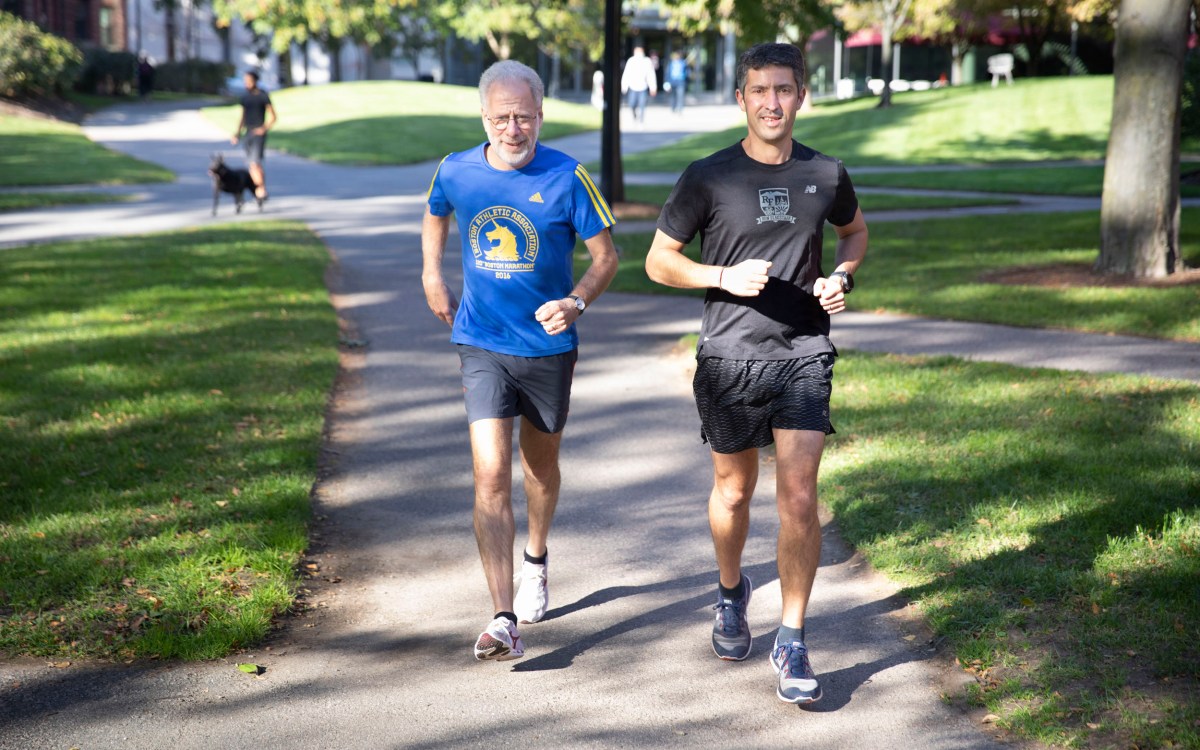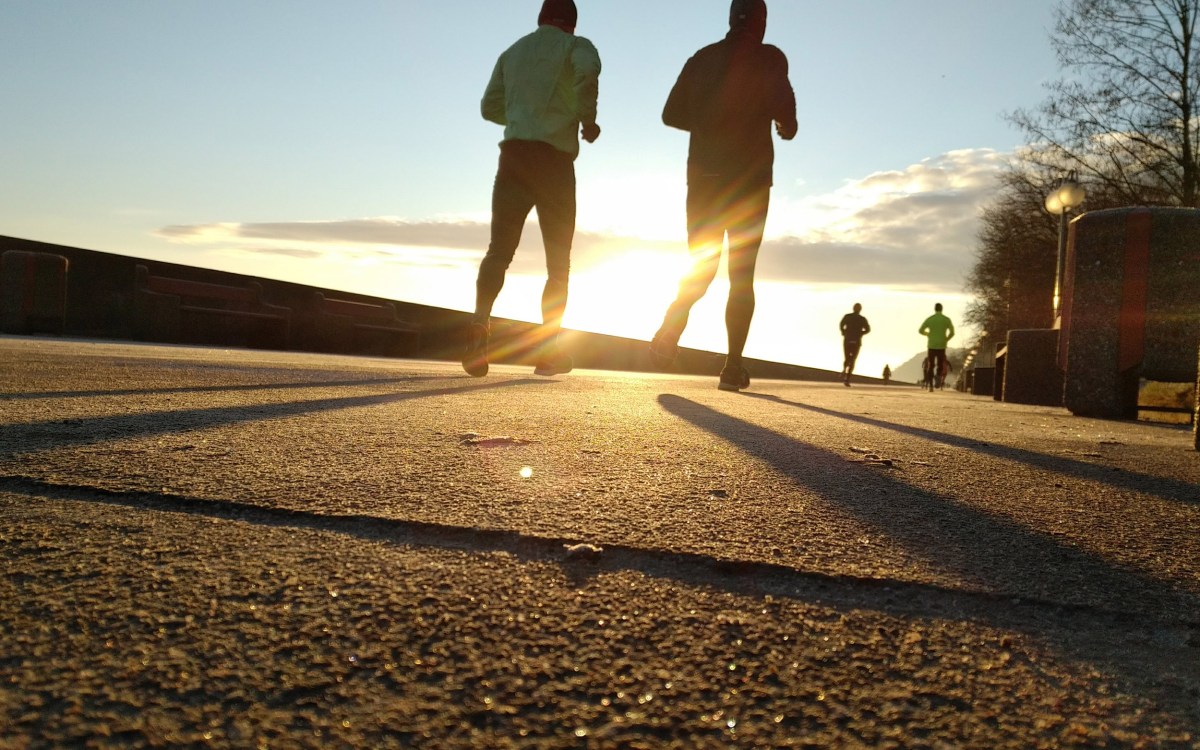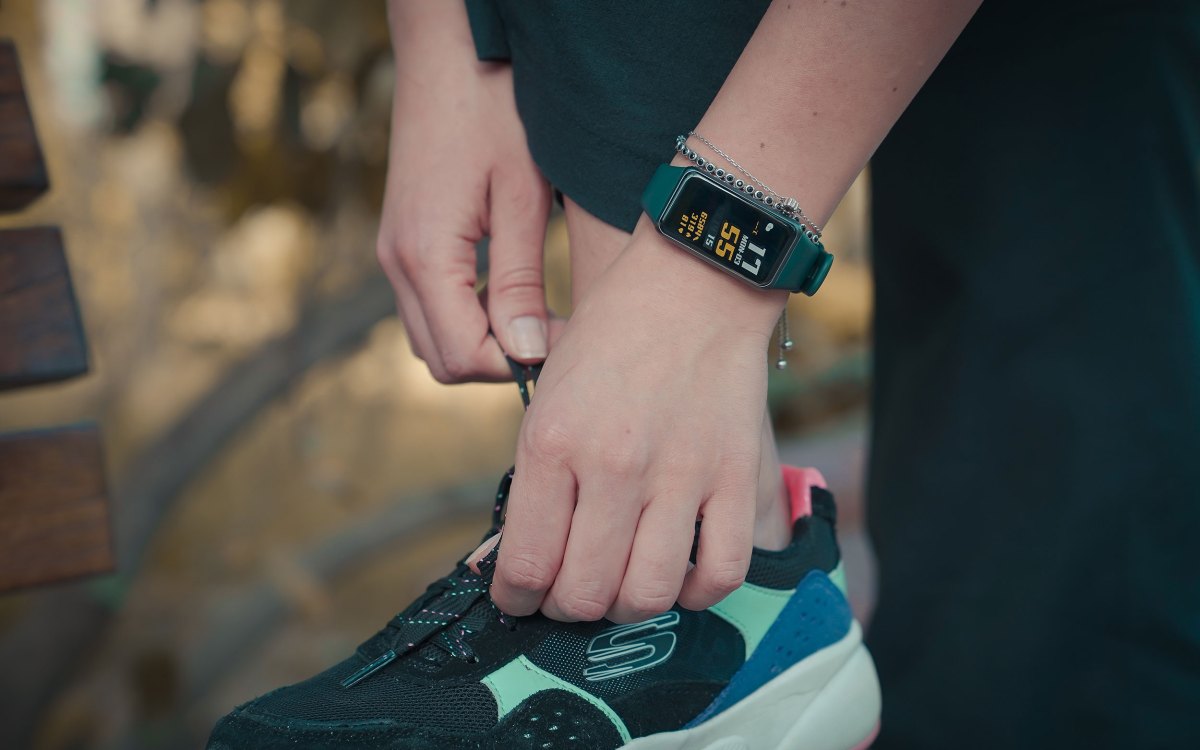Getting some exercise, with a little help from friends — and app
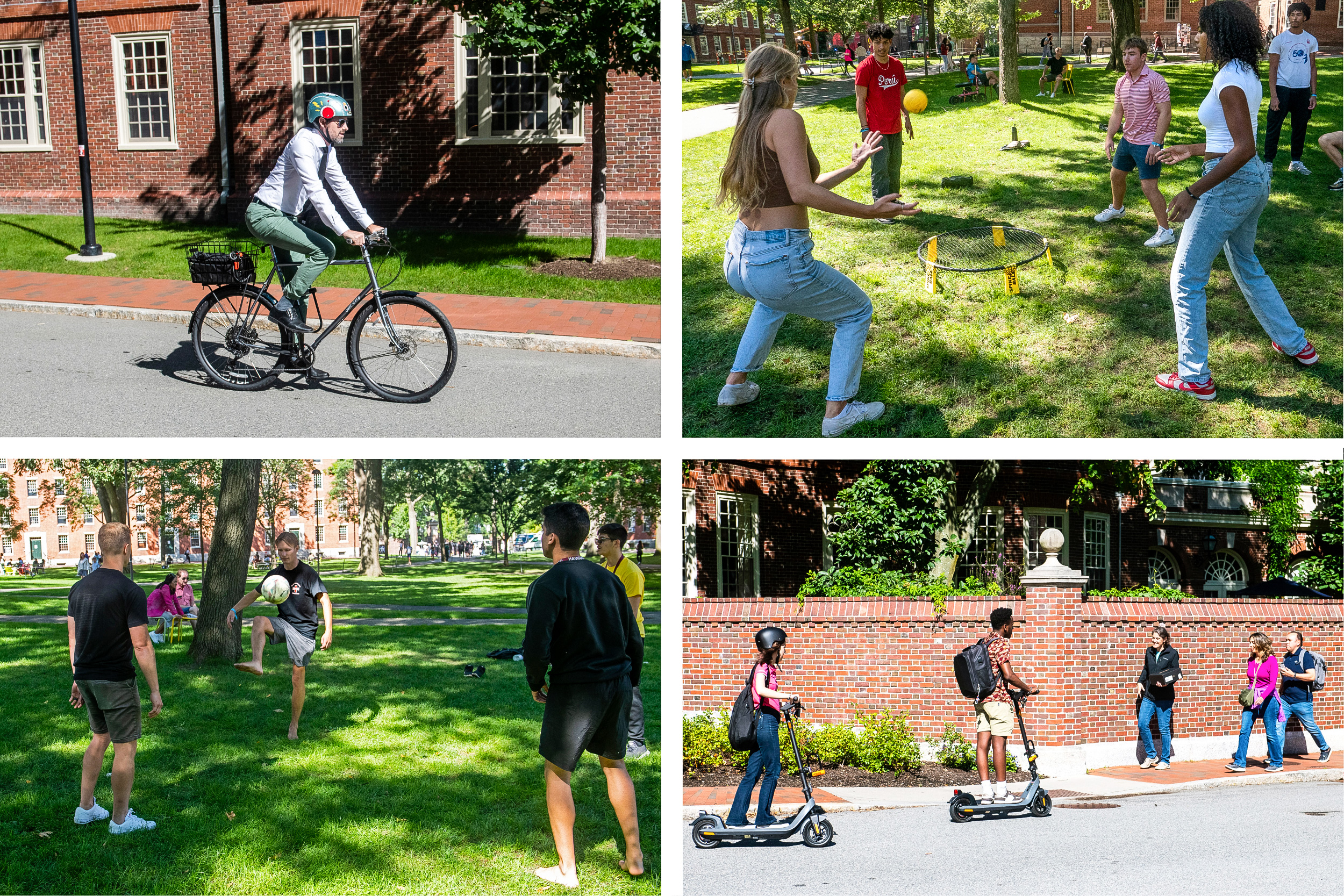
Examples of the kind of physical activity and social connection CrimsonZip is designed to encourage.
Photos by Jon Chase/Harvard Staff Photographer
New CrimsonZip website aims to get Harvard community off couch by helping people find others looking for a workout — or just a walk
Exercise’s health benefits are clear — it lowers the risk of everything from cardiovascular disease to cancer, obesity to depression. But even for those aware of all this, getting off the couch and out the door can be a challenge.
Enter CrimsonZip, a new effort debuting this fall to get Harvard moving with the help of a mobile phone app and a new website. It is designed especially for the University community and encourages all kinds of physical activity, from rigorous endeavors like running, swimming, lifting, and exercise classes to just going for a walk or a leisurely bike ride.
“We’re not looking to turn everyone into long-distance runners, but if we can get 10 percent to 20 percent more activity from people — and then they stick with it — the implications for their lives will be substantial,” said Richard Lee, professor of medicine and stem cell and regenerative biology, and co-chair of the CrimsonZip program.
A key to making it all work involves another healthful pursuit: maintaining strong social circles. CrimsonZip tries to marry the benefits of exercise and social connection with features that make it easy to not only learn about activities on campus — like a run with Harvard on the Move, intramural games, or signups for the upcoming Jimmy Fund Walk — but also to connect with others who are interested in those events.
Harvard’s many subcommunities already offer a wealth of physical activity programs, but it’s not always easy to know what’s out there. CrimsonZip addresses this directly by putting the information in one place. It also promotes connectedness for more casual activities, allowing users to check whether any other users in the library, a dorm, or a House feel like taking a walk for a study break.
“We bring people to places like Harvard, and we teach them that to be successful you have to sit down and listen to lectures, and then sit down and study … we wanted to fight back against that.”
Richard Lee, professor of medicine and stem cell and regenerative biology
“What we anticipate is that folks who are physically active with other people will be more likely to continue doing that because they’re getting a social benefit in addition to a physical benefit,” said project co-chair Giang Nguyen, executive director of Harvard University Health Services, associate provost for campus health and well-being, and the Henry K. Oliver Chair of Hygiene. “There is a lot of research that points to the mental health benefits of exercise, and there is a lot of research to point toward the mental health benefits of social connectedness. Just as with the We’re All Human campaign and other efforts to create a culture that embraces the importance of wellbeing and mental health, CrimsonZip is trying simultaneously to take advantage of both physical activity and social connectedness while supporting mental well-being.”
A 2022 study by researchers from the Harvard T.H. Chan School of Public Health showed that social connections protect against both depression and anxiety. In addition, the decades-long Harvard Study of Adult Development showed that strong social connections provide lifelong physical health benefits: Those who were most satisfied in their relationships at age 50 were also those who were healthiest at age 80.
So that makes CrimsonZip a twofer for health, and here is how it works. The app creates a calendar of activities that have a physical component, large or small, taking place anywhere on campus. It will be available to students, faculty, and staff, and let them connect with others — whether an established friend group, an impromptu tennis partner, or a one-time cycling companion.
“We bring people to places like Harvard, and we teach them that to be successful you have to sit down and listen to lectures, and then sit down and study,” said Lee. “To be successful in our society, we’re telling you that you have to live unhealthfully, so we wanted to fight back against that.”
The mobile app’s initial rollout is focused on the Faculty of Arts and Sciences and Harvard College. The ultimate goal, however, is to expand to all of Harvard’s campuses, and even beyond the University, according to Daniel Lieberman, the Edwin M. Lerner II Professor of the Biological Sciences and another of the program co-chairs. One of the project’s goals is to release the app under a permissive software license so others can use it and adapt it to their own community’s needs.
“If it works here, everybody else on the planet can download this app and use it for themselves and their own institutions,” Lieberman said. “We’re going to make it available to everybody.”
The app creates a calendar of physical activities. It allows students, faculty, and staff to connect with others — whether an established friend group, an impromptu tennis partner, or a one-time cycling companion.
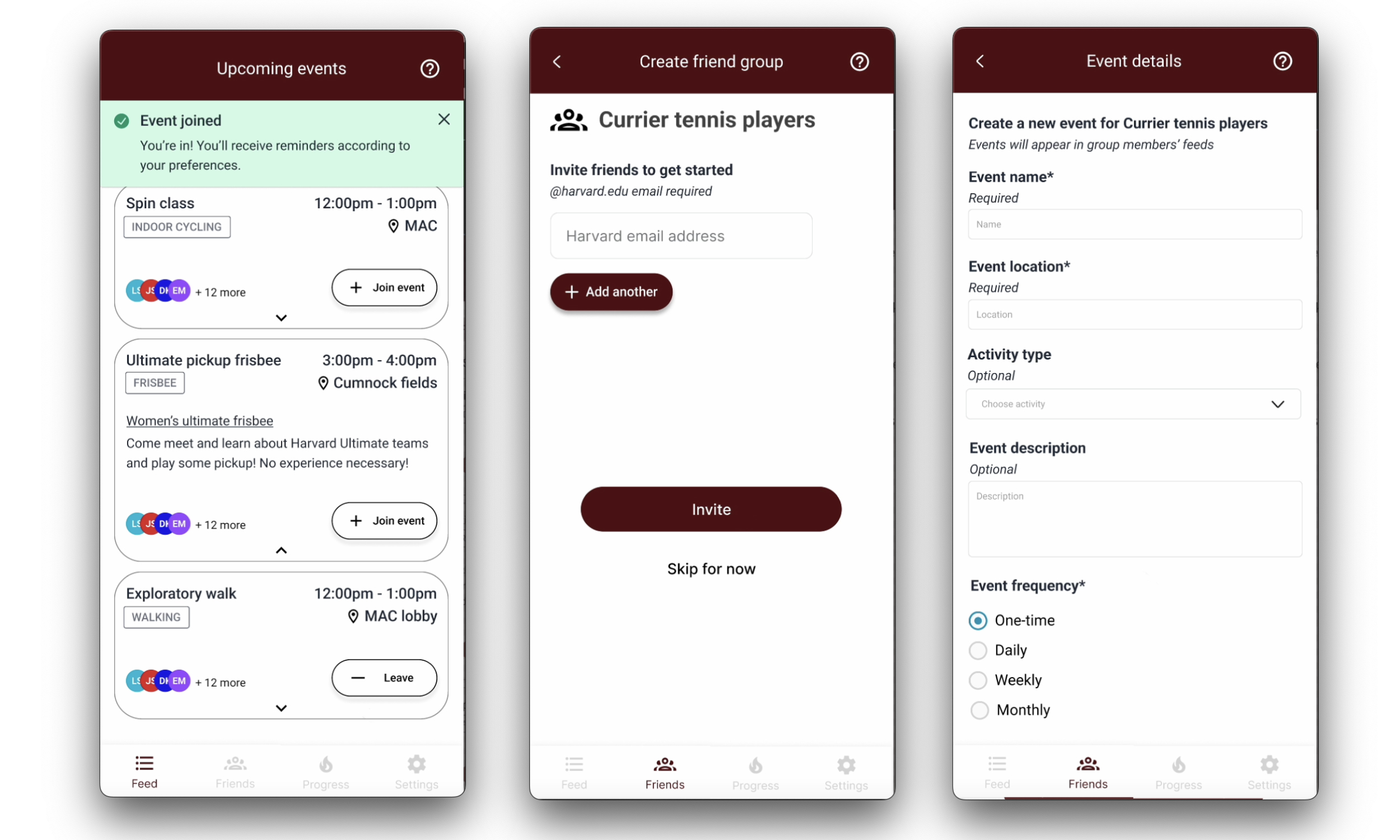
The program grew out of a desire to encourage physical activity in the Harvard community, Lieberman said. Though people sometimes think of college students as universally fit, studies have shown that many aren’t physically active, Lieberman said.
“To help people to be physically active, you have to make it either necessary or rewarding. If you make it neither, guess what, people tend to avoid it, which is a totally natural instinct,” Lieberman said. “For that reason, it used to be that every university in the country required some kind of physical education — Harvard was no exception. Harvard, along with a lot of other universities, dropped that requirement in 1970. Since then, Harvard has made some efforts to make exercise rewarding, but what we have done so far doesn’t work for everybody. Our idea is to create a socially based program to promote physical activity for everybody, not just the people who get it already.”
In 2021, Lieberman wrote “Exercised: Why Something We Never Evolved to Do is Healthy and Rewarding,” in which he discusses — among other topics — why getting people to exercise is so difficult. Shortly after the book’s publication, he came into contact with a Harvard alumnus, Jeff Tarr ’66. Tarr read “Exercised,” wanted to do something to help get Harvard students moving, and provided significant funding for the effort.
The project itself had some trouble getting moving. Lieberman, Lee, and Nguyen approached Harvard’s then-President Larry Bacow to discuss the idea in 2020, just a few weeks before COVID-19 ground campus life to a halt.
But as the pandemic’s emergency phase faded, plans accelerated. Nguyen, Lee, and Lieberman co-chaired a committee of faculty and administrators from an array of related fields, including David Laibson, the Robert I. Goldman Professor of Economics; Ben Friedman, the William Joseph Maier Professor of Political Economy; Latanya Sweeney, the Daniel Paul Professor of the Practice of Government and Technology; I-Min Lee, professor of medicine and of epidemiology; Erin McDermott, the John D. Nichols ’53 Family Director of Athletics; former HUHS Director Paul Barreira; and Maria Francesconi, HUHS’ senior director of nursing and health promotion. Program managers William Goodman, a postdoctoral fellow in Lieberman’s lab, and Morgan Redman, a health educator with HUHS, provided day-to-day oversight.
“To help people to be physically active, you have to make it either necessary or rewarding. If you make it neither, guess what, people tend to avoid it, which is a totally natural instinct.”
Daniel Lieberman, evolutionary biologist
Goodman and Redman said their efforts focused on creating an app that not only pulls information from across campus into one place and allows users to connect with each other but is also intuitive and easy to use.
“One of the concerns with any application development is you roll out the application, the user downloads it, and if they find it too complicated or too hard to use, 30 seconds later they’ll say, ‘It’s not for me,’ and never touch it again,” Goodman said. “We spent a lot of time making it as intuitive and natural as possible. Success for us will be establishing a user base, and when we move into next year, we’ll do a harder push, have a full feature set that has run through active users, and get some metrics on how much they are using it.”
An advantage the project team has over other app developers is that they’re creating something for a single community rather than a broad, national audience. That will let them adjust to feedback fairly rapidly, should analytics, user comments, or other inputs indicate a feature isn’t popular or is confusing.
“There are lots of competing priorities, especially for first-year students who’ve just stepped on campus,” Redman said. “As we introduce the resource to them, we’re trying to help them think about, ‘How do I have my Harvard experience and also maintain my health and well-being?’ This is a resource to help you do that.”
After the rollout new features will be added, and it will be offered to other Harvard Schools as time goes on. Next year, organizers hope to begin using the app to collect anonymized data to gauge its effectiveness.
“It’s frustrating that we’re teaching people to take on lifestyles that aren’t healthy. That’s not the right message,” Lee said. “The habits you develop when you’re young are important predictors of the habits that you have later.”



